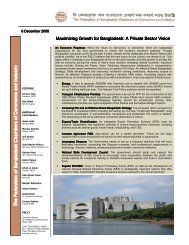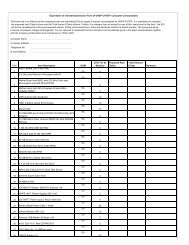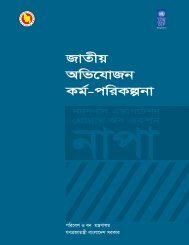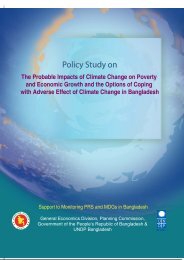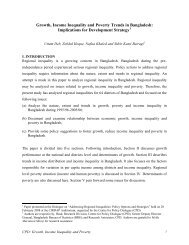Framework for a Strategy of UP Revenue/Resource Mobilisation ...
Framework for a Strategy of UP Revenue/Resource Mobilisation ...
Framework for a Strategy of UP Revenue/Resource Mobilisation ...
You also want an ePaper? Increase the reach of your titles
YUMPU automatically turns print PDFs into web optimized ePapers that Google loves.
It should be pointed out that there are the problems <strong>of</strong> local revenue in <strong>UP</strong>s and that many <strong>of</strong> the<br />
problems faced here are common to local governments around the world. Most <strong>of</strong> what is proposed<br />
here is far from new 14 . Much <strong>of</strong> it is about enabling <strong>UP</strong>s to implement what they are already<br />
supposed to do, or to adopt good practices which have already been adopted in some <strong>UP</strong>s. There is<br />
considerable scope <strong>for</strong> improving <strong>UP</strong> revenue administration. At present, in many <strong>UP</strong>s, only 10-<br />
20% <strong>of</strong> the holding tax is collected and many businesses do not have licences. Collection <strong>of</strong> holding<br />
tax is never likely to achieve 100% achievement because so many people are poor, but a number <strong>of</strong><br />
<strong>UP</strong>s have demonstrated that it is possible to increase collection per<strong>for</strong>mance significantly.<br />
The following are the steps that <strong>UP</strong>s need to take in order to achieve a higher collection<br />
per<strong>for</strong>mance.<br />
a) Prepare a register <strong>of</strong> all properties in the <strong>UP</strong>, including non-domestic properties, and updating<br />
that register annually (see Annex -2 <strong>for</strong> a pro-<strong>for</strong>ma).<br />
b) Use the mass-appraisal system to assess all the holdings. The register, with the assessed values<br />
should be made public so that people can see if there are anomalies, and any collusion between<br />
assessor and household can be revealed. This will inspire public confidence that the system is<br />
fair. 15<br />
c) At present, reductions to assessments are <strong>of</strong>ten made on the grounds that households are poor. It<br />
is suggested that any reductions should be made explicitly (as per the pro-<strong>for</strong>ma at Annex- 2),<br />
ideally, at ward level, if possible, and approved by the <strong>UP</strong>. It is also suggested that the<br />
reductions should be limited to 25% <strong>of</strong> the assessment and should be given only to the most<br />
needy, not to everyone, so that everyone contributes at least something. This will also help to<br />
create trust in the fairness <strong>of</strong> the system. Furthermore, it is proposed that not more than one<br />
quarter <strong>of</strong> households be given a reduction. Annex - 3 provides a pro-<strong>for</strong>ma <strong>for</strong> a revised<br />
assessment register, showing the basic in<strong>for</strong>mation on the property (plot number, owner,<br />
occupation or income source, number <strong>of</strong> rooms, type <strong>of</strong> construction, whether or not there is an<br />
individual water supply on the plot). From this, the basic assessment can be made from the<br />
assessment table (Table-1). There is then a column <strong>for</strong> reasons, if any, <strong>for</strong> a reduced assessment.<br />
The last column shows the final assessment, taking account <strong>of</strong> any reduction (may be 25% that<br />
14 See Nick Devas (July 2007): Local <strong>Revenue</strong> Sources <strong>for</strong> Union Parishads: Report <strong>of</strong> a Study; and Nick Devas<br />
(September 2008): Enhancing <strong>Revenue</strong> Sources <strong>for</strong> Union Parishads<br />
15 Citizens will still have the legal right <strong>of</strong> appeal, first to the <strong>UP</strong>, then to the UNO, and finally to the Deputyt<br />
Commissioner, if he/she considers the assessment is wrong or unfair.<br />
14




